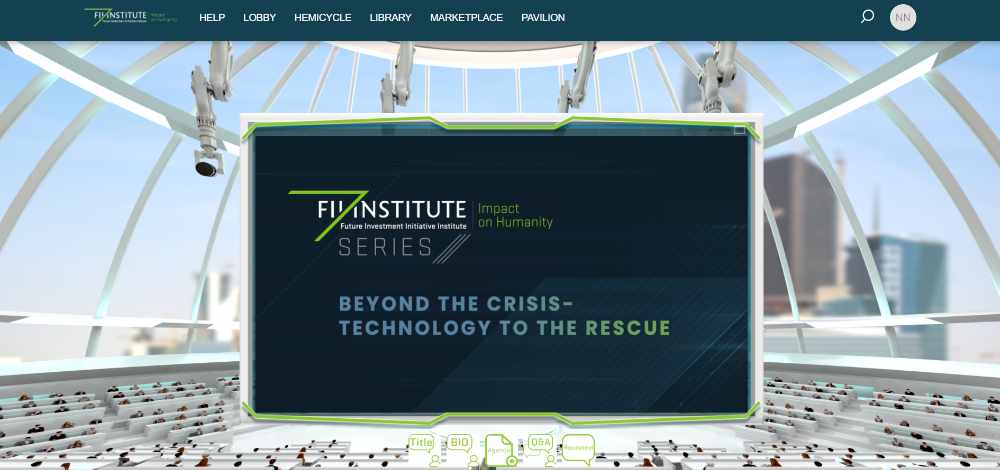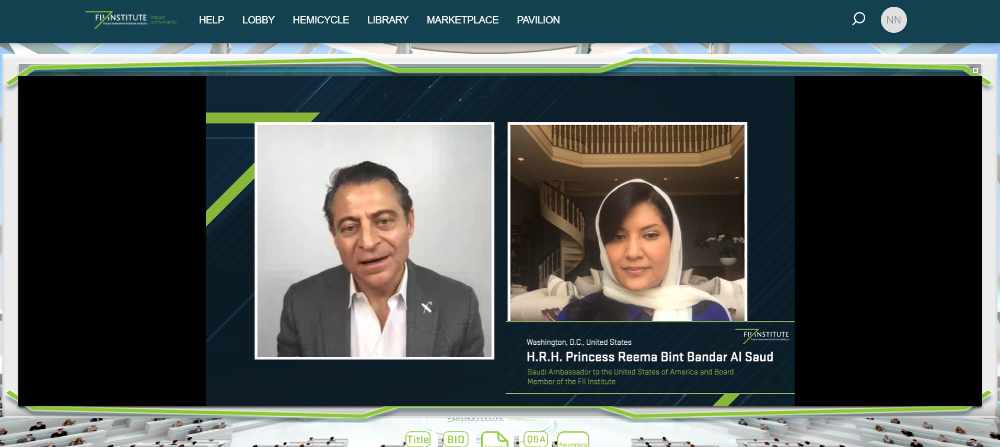RIYADH: The lessons that can be learned from the coronavirus crisis, and how they can be used to develop a roadmap for the future, were the main topics of discussion on Thursday during the first virtual event organized by the Future Investment Initiative.
More than 2,500 people from around the world took part in the online conference, titled Beyond the Crisis: Technology to the Rescue, which aimed to come up with recommendations for concrete, long-term solutions to the challenges the world is facing as result of the pandemic.
A number of international experts offered their perspectives on the crisis, and suggested ways in which the economy, health care industry, government institutions and other organizations might recover and improve in the aftermath of the crisis.
Guest speakers included Kevin Rudd, the former prime minister of Australia, Princess Reema Bint Bandar Al-Saud, the Saudi ambassador to the US and board member of the FII Institute, and Larry Fink, the founder, chairman and CEO of global investment management business BlackRock.

Over 2,500 people from around the world took part in the online conference, titled Beyond the Crisis: Technology to the Rescue. (Supplied)
The event was moderated by entrepreneur and futurologist Dr. Peter H. Diamandis, who highlighted the importance of working together during the pandemic.
“For the first time ever in the history of humanity, we are facing a singular enemy in this virus,” he said. “There has never been a time when the world has been focused on this level at solving one crisis. Hopefully, there will be reasons for hope and optimism.”
Yasir Al-Rumayyan, the governor of the Public Investment Fund of Saudi Arabia (PIF) and chairman of the board of the FII Institute, spoke about the ways in which the current crisis differs from crises of the past, and what is being done to combat its adverse economic effects.
“This is a health crisis, and the economic crisis is a result of that,” he said. “That’s the dilemma, I think, because in an economic crisis you know exactly what you’re up against but the uncertainty that we have from the health crisis is a big challenge.
“If you look at the intervention of governments around the world, it was really unprecedented. I think the difference between this crisis and the 2008 financial crisis is that we determined the problem and we’re trying to fix it. We’re going to fix the core problem rather than the results of it.”
Adah Almutairi, a professor and co-director of the Center of Excellence for Nanomedicine and Engineering at the University of California San Diego, and board member of the FII Institute, said the world was underprepared for the pandemic and recommended more study of the immune system and how it works.
“Why don’t we start thinking of investing in the health care system and investing in life around us?” she asked. “We think of defense, defense, defense — why don’t we start thinking of the health care system as (being) just as important?”

Over 2,500 people from around the world took part in the online conference, titled Beyond the Crisis: Technology to the Rescue. (Supplied)
Princess Reema highlighted the plight of the disabled in communities worldwide, and the importance of ensuring they are not forgotten and their needs are met during the crisis.
“One of the things that break my heart is that we’ve looked at the containment of this virus without looking at the aggregated data of the individuals with disabilities,” she said. “In the Kingdom alone, we have 450,000 people with intellectual disabilities.”
She also called on the entrepreneurs looking for ways to assist recovery in the aftermath of the pandemic to find ways to improve the lives of the disabled.
“To the thinkers, the creators, the innovators listening to us today ... when we think of the next boom of creations that could come out of this, what (will be) the Uber, the Venmo, the Airbnb for this community, because they count and they are important,” she said.
The Future Investment Initiative is an annual forum held in Riyadh, and hosted by the PIF, for discussion of trends in the world economy and the investment sector. The fourth edition is scheduled to take place on Oct. 28 and 29 in Riyadh.




























